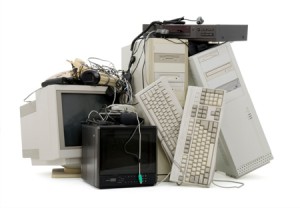E-Waste: What Is It?
Understanding Electronics Waste
One of the fastest growing segments of the waste stream in the United States is electronics discards: better known as e-waste. Electrical waste can include a wide range of items, but is more commonly associated with electronics such as computers, scanners, video monitors, fax machines and other devices that are out-dated or no longer used. In an effort to combat this increasing waste management issue, the Electronics Waste Recycling Act was passed. The 2003 legislation was an important step to address the problem, making it illegal for companies to simply throw out their electronics equipment.
The problem with e-waste is that businesses understand that they are legally obligated to have electronics items properly recycled, but many do not know how this process is conducted. They simply have no idea who to contact to have their electrical devices recycled.
Organizations such as San Diego Electronics Recycling work closely with local businesses in Southern California by performing electronics collection at no cost. After collection of electronics, San Diego Electronics Recycling goes through a process where all equipment is closely analyzed to see if any electronics items can be reused or refurbished. Since reuse of electronics is the absolute best and eco-friendliest form of recycling, San Diego Electronics takes every step possible to find a new home for equipment that still is viable. Electronics items that are not salvageable are then manually taken to facilities for safe and proper recycling.
The Definition Of E-Waste
The simplest definition of e-waste would be electrical devices used by companies or consumers that are essentially out-dated or no longer useful due to newer, faster technologies.
E-Waste: Is It Hazardous?

One of the questions many consumers and businesses have is if electronics devices are hazardous. Although a computer or scanner may not be viewed as hazardous in its complete state, many of the components used inside the devices are known to be hazardous. For example, components known as CRTs (Cathode Ray Tubes) used in video monitors, when in a non-functioning state, are seen in the eyes of California law as hazardous material. The components could be toxic to soil and/or water supplies if not properly disposed of. This is why it is so important that these electronics items are not simply placed into local land fills.
What Should My Business Do With E-Waste?
Businesses with old office equipment such as video monitors, computers, scanners or other devices should contact San Diego Electronics Recycling for a free consultation to discuss e-waste removal. San Diego Electronics Recycling will collect out-dated electronics equipment at no cost, and take every measure to reuse or refurbish electronics items before recycle. Scheduling a free pick-up date with San Diego Electronics Recycling is fast and simple.